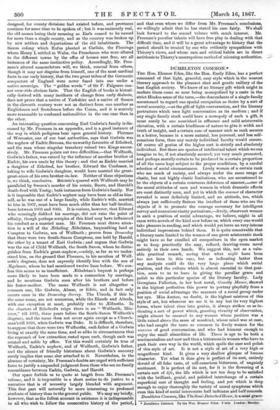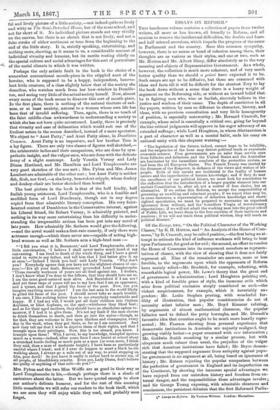DUMBLETON COMMON.*
THE Hon. Eleanor Eden, like the Hon. Emily Eden, has a perfect command of that light, graceful, easy style which is. the nearest literary approach to the pleasant chat and gentle raillery of the best English society. We know of no literary gift which might in modern times come so near being monopolized by a caste in the strict Hindoo sense of the term,—the descendants of a single family accustomed to regard one special occupation as theirs by a sort of moral necessity,—as the gift of light conversation, and the literary portraiture which uses light conversation as its medium ; and if any single family stock could have a monopoly of such a gift, it must surely be one nourished in affluence and mild aristocratic elevation, with a certain kindliness of nature to give it width and truth of insight, and a certain ease of manner such as rank secures in a better, because in a more natural, less personal, and less self- conscious form, than any merely individual faculty would ensure. Of course all genius of the higher sort is strictly and absolutely individual. But there are species of intellectual talent which we can imagine to be, if not absolutely secured, yet very much promoted, and perhaps morally certain to be produced in a certain proportion of all the cases kept subject to the proper conditions, by a careful selection of social circumstances. Lively women of a certain rank who see much of society, and always under the same range of elastic, but not highly elastic limitations, who are accustomed to be the objects of a certain courteoussleference of manner,—one of the moral attitudes of men and women in which dramatic effects are most distinctly seen, and yet in which the amount of character revealed is most definitely limited, and an attitude, too, which always just sufficiently flatters the intellect of those who are the objects of it to promote the courage necessary for intelligent survey and unanxious chatty portraiture,—lively, observant women in such a position of social advantage, we believe, might in all cases write novels of the kind now before us, which every one would take pleasure in reading, and which would yet leave no very intense individual impressions behind them. It is quite conceivable that a literary caste limited to the women of one great aristocratic stock might have so far excelled all competitors in the open market as to keep practically the easy, refined, drawing-room novel entirely in their own hands. We suggest this, not as a valu- able practical remark, seeing that what might have been has not been in this case, but as indicating better than any analysis could do the very large place which social position, and the culture which is almost essential to that posi- tion, seem to us to have in giving the peculiar grace and polish to this particular species of the literary faculty. Lady Georgiana Fullerton, in her best novel, Grandy Manor, showed in the highest perfection this power to portray playfully from a position of social advantage the manners of a social group under her eye. Miss Austen, no doubt, is the highest mistress of this style of art, but wherever we see it in any but its very highest forms, where talent rises into genius, it always strikes us as in- dicating a sort of power which, granting vivacity of observation, might almost be ensured to any woman whose position was a little raised above the mass of mankind, whose mind was at ease, who had caught the taste so common in lively women for the nuances of good conversation, and who had humour enough to enjoy the small absurdities of life. There is apt to be both a sentimentalism and now and then a bitterness in women who have to push their own way in the world, which spoils the ease and polish of this style of art. It is not a style of art of a very high or magnificent kind. It gives a very shallow glimpse of human character. Yet what it does give is perfect of its sort, entirely devoid of all false taste, of self-conscious bitterness, of ungainly sentiment. It is perfect of its sort, for it is the flowering of a certain sort of life, the life which is not too deep to be satisfied with the brilliant, genial, and polished interchange of a certain superficial sort of thought and feeling, and yet which is deep enough to enjoy thoroughly the variety of moral symptoms which even this kind of social intercourse half indicates and half conceals.
Dumbleton Common, like TheSenti-Detached House, is a most grace- • Dumb:eon Gammon. By the Hon. Eleanor Eden. 2 Tole. London : Bentley. ful and lively picture of a little society,—not indeed quite so lively and witty as The Semi-Detached House, but of the same school, and not far short of it. No individual picture stands out very vividly on the canvas, but there is no sketch that is not lively, and not a false stroke of either sentiment or tone from the beginning to the
end of the little story. It is, strictly speaking, entertaining, and nothing more, showing, as it seems to us, a considerable amount of
individual vivacity and humour, but its merits resting chiefly on the special culture and social advantages for this sort of portraiture ''41C of the social climate in which it was written.
Perhaps the only artistic fault in the book is the choice of a somewhat conventional mouth-piece in the crippled aunt of the heroine, who is supposed to be a happy, independent, benevo-
lent little creature, of a class slightly below that of the society she describes, who watches much from her bow-window in Dumble- ton, and seeing very little of the actual society herself. Now, almost every scene of the book seems to disavow this sort of mouth-piece. In the first place, there is nothing of the natural tincture of sad- ness, or at least anxiety, natural to a woman whose own life has been that of invalid suffering. Then, again, there is no touch of the faint middle-class awkwardness in understanding a society to which she has not been quite accustomed. Lastly, there is precisely that vivacity and ease of delineation which would suit one of the liveliest actors in the scenes described, instead of a mere spectator. We object to "Aunt Patty," and Aunt Patty alone, in Dumbleton Common. Aunt Patty is an imposture, and her brother Tom is a lay figure. There are only two classes of figures well sketched,—
the aristocratic ladies and their companions, who are done by sym- pathetic insight, and the vulgar ones, who are done with the delicate irony of a slight contempt. Lady Venetia Verney and Lady Diana Hartland, and Mr. Hamilton and Lord Templecombe are very good sketches of the one sort ; Mrs. Pybus and Mrs. James Lambert are admirable of the other sort ; but Aunt Patty is neither fish, flesh, nor fowl,—a shadowy, benevolent cripple, whose donkey and donkey-chair are better sketched than herself.
The best picture in the book is that of the half kindly, half foolish young aristocrat, Lord Templecombe, who is a feasible and modified form of Lord Dundreary, though not in any degree copied from that admirable literary conception. His very faint- hearted contest of Dumbleton in the Conservative interest, against his Liberal friend, Sir Robert Verney, is admirably painted, and nothing in its way more entertaining than his difficulty in under- standing the irrepressible artisan has been put into any novel of late years. How admirably Mr. Sothern would give the following, —and the novel would make a first-rate comedy, if only there were actresses enough—which there never are—capable of acting high- bred women as well as Mr. Sothern acts a high-bred man :- "'I fell you what it is Beaumont,' said Lord Templecombe, after a little conversation, 'I believe I shall never make much hand of my canvassing. I am tired to death of the whole thing, and I have a great mind to write to my father, and tell him that I had better give it up at once.'—' Indeed I think you had,' said Lady Venetia. Why don't you? Everybody agrees that you have not the slightest chance of sue- cess.'—'It's all your fault, Beaumont,' proceeded Lord Templecombe.
Those rascally workmen of yours are all dead against me. I declare, I don't know what I've done to the fellows, that they should hate me so. I am the most good-natured man alive. Ask Berresford if I am not ? And yet these imps of yours tell me to my face that I am an oppressor, and a tyrant, and that I grind the faces of the poor. Now, can you imagine anything more unjust? I am the last man in the world likely to grind the faces of the poor. I should never take so much trouble. I am sure, I like nothing better than to see everybody comfortable and happy. If I had my will, I would put all their children into Orphan Asylums, or Idiot Asylums, on the spot—whichever they liked beat; and as for their aged mothers, they should have an almshouse apiece to- morrow, if I had it to give them. It's not my fault if the men choose to drink themselves to death, and then go into the union—though, as for that, they are welcome to live upon chicken and champagne, every day in the week, when they get there, so far as I am concerned. And now they tell me that I wish to deprive them of their rights, and that I trample upon their privileges. Now, this is too absurd, you know. I trample upon them ! Why, I never, to my knowledge, trampled uponso much as a worm—indeed, after some lines I once learnt at school about a crunched beetle feeling as much pain as a man (or even more I think they said, than a man of moderate height), I have been so particularly careful where I tread ; and if I ever do happen to meet a black beetle walking about, I always go a mile out of my way, to avoid stepping on him, poor devil! So you know it really is rather hard to accuse me, of all people, of bloodthirsty cruelty. Even you, Lady Diana, don't believe me guilty of anything of that sort—do you? " '
Mrs. Pybus and the two Miss Wolffs are as good in their way as Lord Templecombe in his,—though perhaps there is a shade of caricature about the latter. But we have quoted enough to show our author's delicate humour, and for the rest of this amusing little comedietta we will refer our readers to the book itself, which we are sure they will enjoy while they read, and probably soon forget.































 Previous page
Previous page